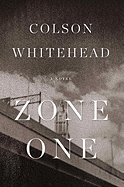
The word "zombie" never appears in Colson Whitehead's (Sag Harbor) post-apocalyptic story of a world decimated by a plague that turns humans into flesh-eating monsters. But the groaning, staggering, ravenous creatures that haunt the novel are unmistakably zombies, and Zone One is an unmistakable contribution to an increasingly popular horror subgenre. With characteristic thought and wit, Whitehead elevates the familiar tropes and presents a novel about survival, reformation and the emblematic chaos of modern New York City.
The worst of the plague is over. A provisional government has formed, and volunteers are preparing the city for resettlement. Our antihero, nicknamed Mark Spitz, is part of a team assigned to clear Lower Manhattan ("Zone One"), and the story follows him over three increasingly uneasy days as he hunts for the plague's leftovers and disposes of their remains. It's a grim job, but all the gruesome descriptions and chilling flashbacks are infused with darkly comic ruminations: "Manhattan was empty except for soldiers and legions of the damned," Mark notes as military officers claim homes in the ruined city, "and already gentrification had resumed."
Whitehead is not so heavy handed as to draw an explicit connection between his zombie apocalypse and 9/11, but it's an easy analogy to make: The Lower Manhattan setting, the empty slogans and songs spurred by the reconstruction, the ring of familiarity between "Zone One" and "Ground Zero." But Zone One is about more than zombies, and more than 9/11. It's a portrait of modern civilization--and how devastatingly fragile it is. --Hannah Calkins, Unpunished Vice

